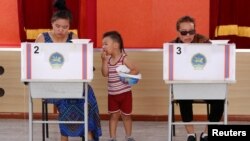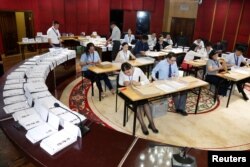Mongolians head into a second round of presidential elections Friday as voter cynicism runs high and investors watch for hints to the direction the northeast Asian country will take for its economic recovery.
The poll is being seen as a referendum on the government's economic recovery plans and the role of giant southern neighbor China in the landlocked but resource-rich country known as the birthplace of Mongol emperor Genghis Khan.
The presidential race went into a runoff after none of the three options won a majority late last month.
A populist former martial arts star, Khaltmaa Battulga of the opposition Democratic Party won the most votes, but fell short of the required majority.
Voters regard Battulga as a resource nationalist who is suspicious of China.
He faces the candidate of the ruling Mongolian People's Party (MPP), Miyeegombo Enkhbold, who came in second.
Enkhbold has stood behind the current government and prime minister, pledging to stay the course for economic recovery following a $5.5-billion rescue package from the International Monetary Fund and partners in May.
Battulga has captured the attention of voters who feel Mongolia has got a bad deal on investments, promising greater government control of strategic mines, such as Rio Tinto's Oyu Tolgoi copper mine.
Enkhbold, for his part, has promised to deliver money owed from a universal child welfare fund.
The race has been clouded by allegations of corruption and voter fraud by all sides, with many voters dismayed by their choice of candidates and the government's inability to bring them prosperity.
But the country's 1.9 million voters also have a third option, according to the so-called "White Ballot" campaign: to leave their votes blank.
"Our goal is to have every voter know they have an option to vote for none of the above," said spokesman Mogi Badral Bantoi.
For many voters, handing in blank ballots is a last-ditch effort to deny either candidate a majority, so forcing a re-run of the poll from scratch, with the selection of fresh candidates.
The runoff vote comes amid a government crackdown on election reporting and a controversial new anti-defamation law that took effect from July 1 and which Mongolian rights groups fear could discourage free speech.
Mongolia is a parliamentary democracy. The government is run by a prime minister, but the president has powers to veto legislation and make judicial appointments.








